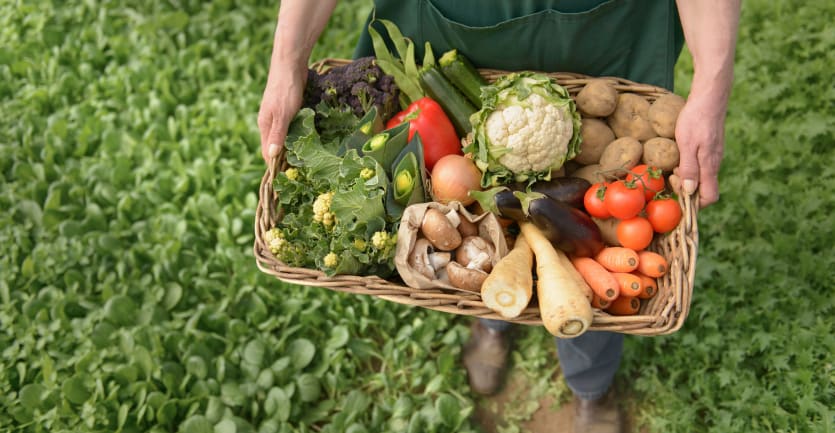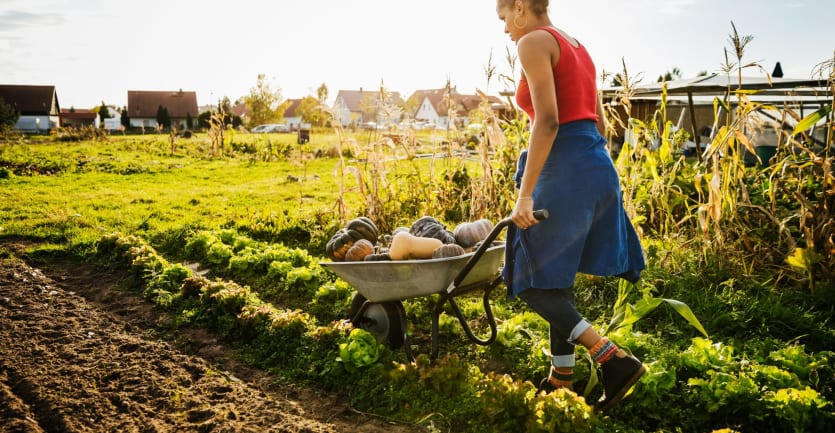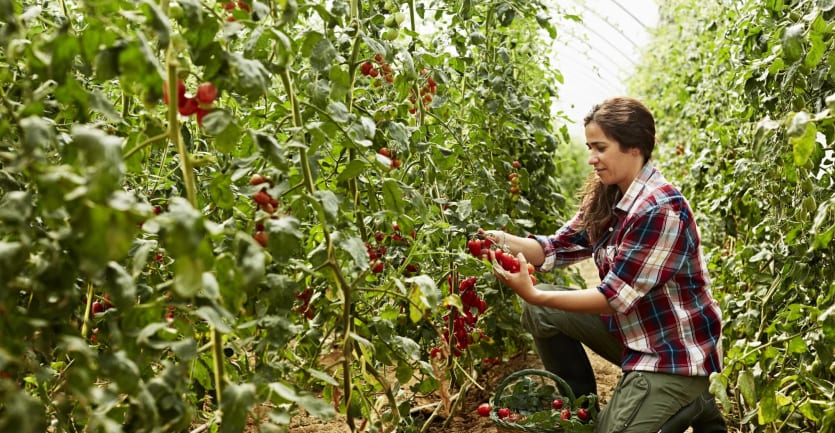A Guide to Organic Farming Degrees and Careers
- Organic farming and sustainable agriculture can be studied at the college level.
- Demand for organic food continues to grow, making it a solid career path for students.
- Students can choose from multiple careers, such as farmer, consultant, or inspector.
The future of conventional farming doesn’t exactly inspire optimism. The Bureau of Labor Statistics (BLS) projects that employment for farmers will decline 1% over the next decade. This year threw that projection into even more uncertainty, with the COVID-19 pandemic greatly affecting agriculture — not to mention nearly every other industry.
Despite these unsettling predictions, one sector in the agriculture industry has maintained a steady upward trajectory for several decades: organic farming.
From 2011 to 2017, the number of organic farms in the U.S. increased by almost 75%. By the end of this period, there were nearly 16,000 organic farms.
Still, the percentage of organic farms in the U.S. remains relatively low compared with the agriculture industry at large. Of the 900 million acres of farmland in 2017, about 9 million acres grew certified organic food, meaning that only 1% of the country’s farmland was dedicated to producing certified organic products.
As the agriculture industry faces a turbulent future, organic farming continues its upward trend. And consumers aren’t the only ones investing in organic products. In 2018, Congress passed an $867 billion farm bill, which allocates research funds to organic farming.
What Is Organic Farming?
The term “organic” often feels like a buzzword. You might think of the green sticker on your produce, or the more expensive aisle at the supermarket. In reality, farmers follow specific guidelines so that the U.S. Department of Agriculture (USDA) can certify their produce as organic.
Compared with non-organic farming, organic farming takes a more natural, sustainable approach to agriculture. Organic farmers avoid genetically modified plants and animals, and actively refrain from using fertilizers and growth hormones.
These farmers also use alternative strategies so they can avoid having to rely on pesticides and other artificial substances. For instance, they may manage pest control by strategically isolating or mixing crops, or by introducing predatory bugs to feed on crop-eating insects.
The intense labor involved in organic farming is just one of the reasons why organic products tend to be more expensive than non-organic products.

Is Organic Food Actually Better for You?
Despite what many people might think, organic versus non-organic isn’t a simple issue of good versus bad. For one, not all conventional agriculture uses the same farming mechanisms and strategies — and neither does all organic farming.
Exposure to pesticides through non-organic foods can harm vulnerable populations, including pregnant women, infants, and children
In addition, research frequently provides contradictory messages about organic farming and food. For example, many nutritionists point to studies concluding that organic and non-organic foods differ very little in nutritional value. Other studies, however, show that organic crops, such as carrots and blueberries, possess higher concentrations of antioxidants, and that organic dairy and meat contain significantly more omega-3 fatty acids.
Research has also found that exposure to pesticides through non-organic foods can harm vulnerable populations, including pregnant women, infants, and children. Farm workers who handle pesticides directly are at risk as well. This exposure can lead to Parkinson’s disease, respiratory problems, memory issues, and other ailments.
Finally, organic farming tends to be better for the environment. One USDA scientist — who has monitored the differences between organic and conventional farming for nearly 30 years — found that organic farming systems typically use less energy, fertilizer, and herbicide; fix more carbon in the soil; and produce more fertile soil overall.
At the same time, organic farming usually uses more land, which can result in less land for carbon sequestration.
The Growth of the Organic Agriculture Industry
Despite the gray areas in research, a Pew Research Center study found that Americans often choose organic foods for ethical reasons and because they believe such products are healthier.
In the past three decades, these beliefs have grown even stronger.
Retail sales of organic food increased every year between 1994 and 2014, from less than $5 billion to almost $35 billion.
Much of this growth occurred during the past two decades. Documentaries like 2008’s “Food, Inc.” and 2011’s “Farmaggedon” symbolize the cultural paradigm shift in organic food.
Millennials have also spurred consumer interest in organic products. In a 2014 Gallup survey, more than half of respondents aged 18-29 reported trying to include organic foods on their grocery runs, while the same was true for just one-third of respondents aged 65 or older.
These days, finding organic groceries at the supermarket is as easy as spotting tabloids in the check-out aisle. According to the 2019 Organic Industry Survey, organic food sales hit $52.5 billion in 2018 — that’s about double what it was the previous decade.

Organic Farming in Higher Education
Nowadays, students can study an array of topics, such as insect conservation, floriculture, and slug control, in the organic farming field, as more colleges implement organic on-campus farms, research programs, certificate programs, and bachelor’s and graduate degrees.
The USDA also recently began funding organic agriculture in higher education, offering grants to support research in the field. Penn State, for instance, received $1.3 million from the USDA in November to further research on helping farmers transition to organic crops and livestock.
Although organic agriculture has become a more common staple at colleges in the past 15 years, the field has a long history in both higher education and the agriculture industry as a whole.
Rachel Carson’s 1962 book “Silent Spring” discusses the environmental consequences of using pesticides. Eight years after its publication, Americans celebrated the country’s first Earth Day.
In the mid-1970s, students at UC Davis began exploring the concept of alternative agriculture. The Student Experimental Farm, as it was called, ultimately stuck around. Now, the university is home to the Agricultural Sustainability Institute.
Today, many schools across the country offer programs in organic and sustainable agriculture, allowing students to specialize in areas such as crops, horticulture, pest control, and soil quality.
But the organic agriculture movement didn’t truly gain momentum until the 1990s and early 2000s. At this time, the U.S. experienced an increased demand for organic foods, according to Professor Stefan Seiter, senior instructor and advisor in crop and soil science at Oregon State University (OSU).
Seiter began teaching sustainable agriculture in 1999 in Pennsylvania. In 2005, he developed and taught OSU’s first organic agriculture course — and students were eager to enroll.
“OSU’s original ‘organic farming and gardening’ course grew quickly to the point where multiple lab sections were offered,” Seiter said. “Students come from across campus, many without prior background in agriculture.”
Around that time, other universities, including the University of Florida, Washington State University, Michigan State University, and Colorado State University, started developing full organic agriculture degrees.
Today, many schools across the country offer programs in organic and sustainable agriculture, allowing students to specialize in areas such as crops, horticulture, pest control, and soil quality.
Where Can You Study Organic Farming?
Many schools offer degrees, as well as certificates and training programs, in organic agriculture. Below is a selection of undergraduate programs in organic farming at colleges and universities across the country.
Undergraduate Organic Agriculture Programs
- Cornell University’s BS in Agricultural Sciences (Concentration in Organic Agriculture)
- Iowa State University’s Organic Agriculture Program
- Maharishi International University’s BA in Regenerative Organic Agriculture
- Michigan State University’s BS in Horticulture (Concentration in Sustainable and Organic Horticulture; Organic Farming Training Program
- Oregon State University’s Organic Agriculture Program
- University of Florida’s BS in Horticultural Science (Concentration in Organic Horticultural Systems)
- University of Georgia’s Certificate in Organic Agriculture
- University of Minnesota’s BS in Food Systems (Concentration in Organic and Local Food Production)
- University of Tennessee’s BS in Plant Sciences (Concentration in Organic Production)
- Washington State University’s BS in Organic and Sustainable Agriculture; Certificate in Organic Agriculture
What Can You Do With an Organic Agriculture Degree?
One popular career option for organic agriculture students is to become an organic farmer, which normally involves managing other employees and carrying out essential tasks like marketing and selling food.
Other career paths include working for the USDA, in which you could contribute to the organic food certification process, and finding a job as an inspector, in which you would evaluate farms for federal or state government agencies.
You could also become a consultant, helping farmers expand their operations and strategize to overcome challenges. Alternatively, you might try your hand at working as a purchasing agent or buyer for grocery stores or restaurants.
Many students stay in academia as well, eventually earning a master’s degree or Ph.D. in organic agriculture or a related field. A doctorate can help individuals land jobs in academic or industry research.

Should You Study Organic Agriculture?
Students decide to pursue degrees in organic farming for many reasons besides ethical considerations. Many learners choose a career in organic agriculture because they want to make a tangible difference in the world.
“If you work in this field, you can make an impact on some real serious issues we face today, including climate change and human health,” Seiter said.
The steadily growing demand for organic agriculture is an encouraging sign in terms of potential job opportunities. Although the BLS does not collect data specifically for organic farming, the agency published a report, which concluded that “given the increases in organic food sales … opportunities are likely to continue in the occupations related to organic foods.”
Nevertheless, organic farming only makes up a small percentage of the job market. Seiter advises students to not just study organic farming techniques but to also acquire skills that will make them competitive in the agriculture and food industries in general.
“Organic food is still a growing sector in the food industry. That means that you need knowledgeable employees along the entire supply chain, from production to marketing,” Seiter explained. “The job market is still not very clear, so as a student, I would make sure that I am also employable outside of organic agriculture.”
Explore More College Resources

How to Start a Career in Sustainability
College students today are more passionate about the environment than ever. Discover the value of a green degree and learn how to chart a sustainable career.

by Anne Dennon
Updated May 13, 2022

